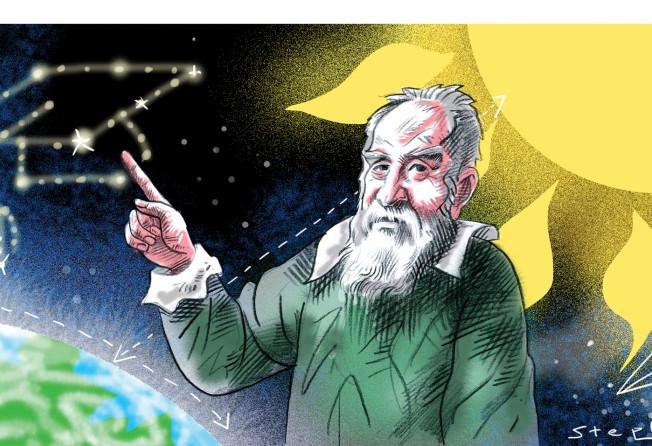Hong Kong universities must uphold the absolute principle of academic freedom
Sun Kwok sees no room for compromise to scholars' freedom to ask questions, and Hong Kong is no exception

The notion of academic freedom has been receiving a lot of attention lately. In modern scholarly circles and universities, academic freedom is the most sacred of all principles. It protects scholars and scientists from persecution when they ask questions or pursue studies on subjects that are not politically correct, contrary to popular belief, or against community standards. This Western concept developed after hundreds of years of political and religious oppression in Europe, from which we finally escaped in the mid-20th century.
The most famous historical case is probably the persecution of Galileo Galilei by the Vatican in 1633. Galileo was a strong supporter of Copernicus' heliocentric (sun-centred) theory, which posited that the earth and five planets revolve around the sun. In 1632, Galileo published the book, Dialogue Concerning the Two Chief World Systems: Ptolemaic and Copernican, in which he used imaginary conversations between Aristotle, Ptolemy and Copernicus to argue that the heliocentric theory better explained observational facts than the geocentric theory that the sun and planets revolve around the earth.
Because of this book, Galileo was brought to the Vatican in 1633 to face charges. He was put under inquisition and threatened with torture. Galileo recanted and was sentenced to house arrest for the rest of his life. Only in 1992, 350 years after Galileo's death, did Pope John Paul II formally acknowledge the church's error.
Galileo's case was not the worst example of persecution. Giordano Bruno was tried for heresy in 1593 and burned at the stake in 1600 for promoting the belief that the sun was just a nearby star and that there might be other planets revolving around distant stars. We now know that these ideas are correct. But at that time, they countered the church's doctrine that the sun was unique and existed for the benefit of humans, a special people created by God.
Whether the earth revolves around the sun or vice versa may seem like an academic issue, but the heliocentric theory implies that humans do not occupy a special place in the universe. It also disrupts the theological structure that the earth occupies a special place between hell and heaven, which is supposed to lie beyond the sphere of fixed stars. As the theological foundation weakens, society's hierarchical structure is also cast into doubt.
The originator of the heliocentric theory, Nicolaus Copernicus, was very conscious of the church's possible reaction to his own ideas. He hesitated to publish his findings. When his work Six Books on the Revolutions of the Heavenly Spheres was finally published in 1543, the year that he died, he took care to dedicate the book to Pope Paul III and included a supporting letter from Cardinal Schönberg in the preface. Thanks partly to these precautions, Copernicus' book avoided controversy until 1616, when it was banned by the Vatican.
Science, by its nature, is about exploring the unknown, and such pursuits often lead to unexpected conclusions. Many theories, when first proposed, were highly controversial. The theory of evolution, now regarded as the backbone of modern biology, was unpopular because it was viewed as contrary to the Bible, which states that God created all living things.
In more recent times, Hitler established policies against Jewish science (including the theory of relativity) and Stalin imposed Marxist philosophies on the study of genetics. These policies had disastrous effects on the development of science in Germany and the Soviet Union.
These hard-learned historical lessons make modern academics extremely sensitive to political, religious or other influences on academic affairs. Nearly all scholars feel that they should have the freedom to ask questions, wherever it takes them.
Even today, challenges to academic freedom continue to occur. Recently, the governor of Wisconsin, Scott Walker, proposed changing the goal of the University of Wisconsin system, a group of state-supported public universities, from "search for truth" to "workforce readiness". This led to huge outcries as academics believe that universities exist to train students as independent thinkers, not to prepare them for specific vocations.
Walker also wants to change the rules of tenure, which professors say are needed to protect them from the repercussions of undertaking unpopular academic pursuits. Given the perceived threats to academic freedom, the University of Wisconsin will find it near-impossible to recruit good academic staff. This hurts the students, the state and its citizens.
What is the lesson for Hong Kong? We have a young and fragile system of public universities. Because we are publicly funded, the different sectors that we serve will always place demands on us. Some may argue that academic freedom should have limits. But where do we draw the line? Once limits are imposed, they have a tendency to shift.
This is why academics want to maintain academic freedom as an absolute principle.
Universities need to be held accountable for their performance, but they should be left alone to do their job. The government should take a long-term, arms-length approach and leave the day-to-day running of university affairs to the administrators. Hong Kong universities have come a long way in the past 10 years. I hope they will continue to rise and join the ranks of the world's top universities.
Good universities and an educated populace are the surest ways to a prosperous society.
Professor Sun Kwok is the dean of science of the University of Hong Kong. He is currently the president of the commission on interstellar matter of the International Astronomical Union